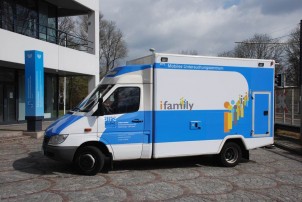Introducing the I.Family Project…
I.Family – Investigating the determinants of food choice, lifestyle and health in European children, adolescents and their parents
The EC Funded I.Family Study investigated and reported on these issues, helping to identify the reasons why young people in Europe eat the way they do and how this influences lifelong health.
European citizens in 2000 lost 56 million years of healthy life due to nutrition-related diseases. Many factors come in to play. Family time and influence are challenged by modern independent lifestyles. Processed foods, drinks and snacks are readily available.
Marketing and peer pressures, accompanied by screen-based distractions that replace outdoor play and a built environment that reduces opportunities for physical activity, all play their part, under-pinned by learnt taste preferences and genetic predispositions.
I.Family will make a significant contribution to understanding the interplay of these complex factors and reducing adverse health results. This EC funded research project followed up the large IDEFICS children’s cohort in the stage between childhood and their teenage years, a period of great change. I.Family has provided further insight into the most important influences on this group of young people, their lifestyle behaviour and their eating habits.
The project’s acronym – I.Family – highlights the project’s focus on both the influences on the individual and on their family. I.Family re-assessed families as their children move into adolescence, identifying those families that have adopted a healthy approach to food,eating habits and lifestyle choice and those that have not.
The focus has been on the family environment, socio-behavioural and genetic factors. Groups with contrasting dietary profiles have been studied, looking at measures of brain activity, the relation of genes to food choice, biological and genetic basis for taste thresholds, sleep patterns, sedentary time, physical activity and impact of their local built environment.
The project has helped us understand the biological, behavioural, social and environmental factors that drive dietary behaviour as children journey towards adulthood. It is therefore of interest to policy-makers and healthcare professionals keen to ensure how best to support families to achieve healthier lifestyles.
Families and individuals themselves will also benefit from the clarity provided by I.Family’s work, helping them to establish the ground rules that will lead to enjoyment of a longer, healthier life.
The I.Family study covers research areas which have examined family, environment, social, behavioural and genetic factors.
It drew on a wide range of scientific disciplines to build an integrated picture of the overall study area, with 9 different work packages including overall project management and cascade/communications, covering:
- Epidemiology – causes, distribution, and control of disease in populations
- Assessment of dietary behaviours
- Biological and neurobehavioral susceptibility factors
- Physical activity and the built environment
- The family and its environment
- Consumer health behaviour and environmental factors
- Consumer awareness, ethical acceptability and policy
The findings of the work packages have been drawn together and communicated widely to support policy development and to drive behavioural/dietary change and is being shared regularly through the project’s own and peer reviewed publications.
I.Family built on data collected from over 10,000 children under 10 years of age in the IDEFICS Study as they moved into adolescence.
Running for 5 years from March 2012, I.Family has taken research on dietary behaviour to the next level, providing insight into the most important influences on Europe’s young people, their lifestyle behaviours and their eating habits as they move into adolescence.
Further information available at;
 |
This project has received funding from the European Union’s Seventh Framework Programme for research, technological development and demonstration |







